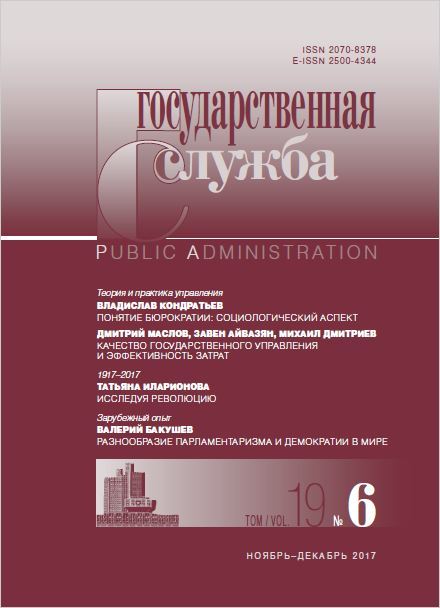Рекомендуемая ссылка на статью:
Владислав Павлович Кондратьева
аСреднерусский институт управления – филиал Российской академии народного хозяйства и государственной службы
DOI: 10.22394/2070-8378-2017-19-6-6-10
Аннотация:
В статье рассматриваются особенности термина «бюрократия» в контексте смежных понятий – «государственная гражданская служба (служащие)», «чиновники», «государственный аппарат». Негативно-оценочный смысл, заложенный в термин «бюрократия», долгое время препятствовал исследованию соответствующего комплекса явлений, игнорировалась роль бюрократии как необходимой составляющей механизма государства и как социального института. Наиболее заметным это влияние оказалось в отношении теории государственной гражданской службы. На Западе частичная реабилитация понятия бюрократии началась в середине XIX века. Этому способствовали попытки аргументированного разграничения между политической и государственно-административной деятельностью в целях рационализации государственного управления. В рамках этого процесса М. Вебер построил модель идеальной бюрократии. Одновременно было отмечено сходство между бюрократическими аппаратами, обеспечивавшими выполнение государственных функций как в древних, так и в современных государствах, указывающее в определенных условиях на инвариантность данной организационной модели. В XX веке бюрократия изучалась с позиций теории систем, социологии. В России понятие бюрократии до настоящего времени имеет чаще всего негативные коннотации. Отсутствие теоретического консенсуса в зарубежной и в отечественной науке, касающегося разграничения негативного значения термина, как порока механизма управления и его нейтрального значения, как универсального механизма управления и социального института, по-прежнему служит препятствием к построению современной теории государственной гражданской службы. В статье предлагается программа исследований по трем базовым направлениям: общая теория бюрократии, механизмы трансформации бюрократии в рамках различных организационных культур, формы и закономерности негативной инверсии бюрократии и механизмы противодействия им.
Abstract:
The article discusses the features of the term ‘bureaucracy’ in the context of related concepts – ‘state civil service (employees)’, ‘officials’, ‘the state apparatus’. Negative-evaluative meaning, embedded in the term ‘bureaucracy’, prevented the study of the corresponding complex of phenomena for a long time, ignored the role of bureaucracy as a necessary component of the mechanism of the state and as a social institution. This influence was most noticeable in relation to the theory of the state civil service. In the West the partial rehabilitation of the concept of bureaucracy began in the mid-nineteenth century. This was facilitated by attempts to provide a reasoned distinction between political and public-administrative activities in order to rationalize public administration. Within the framework of this process, M. Weber constructed a model of an ideal bureaucracy. Simultaneously, a similarity between bureaucratic apparatuses ensuring the performance of state functions in both ancient and modern states, indicating under certain conditions the invariance of the given organizational model, was noted. In the twentieth century the bureaucracy was studied from the standpoint of systems theory and sociology. In Russia, the concept of bureaucracy up to the present time has had almost exclusively negative connotations. The absence of the theoretical consensus in the foreign and domestic science dealing with the delineation of the negative meaning of the term as a defect in the management mechanism and its neutral significance as a universal management mechanism and social institution continues to serve as an obstacle for the construction of a modern theory of the state civil service. Based on the results of the article, a research program is proposed in three basic areas: the general theory of bureaucracy, the mechanisms for transforming bureaucracy within the framework of various organizational cultures, the forms and patterns of negative inversion of the bureaucracy and the mechanisms for countering them.
Ключевые слова:
бюрократия, государство, государственная служба, государственный аппарат, механизм государства, государственное управление
Keywords:
bureaucracy, state, public service, state apparatus, state mechanism, public administration
Литература:
Вебер Макс. Хозяйство и общество: очерки понимающей социологии [Текст]: в 4 т. / Макс Вебер; [пер. с нем.]; сост., общ. ред. и предисл. Л.Г. Ионина; Нац. исслед. ун-т «Высшая школа экономики». М.: Изд. дом Высшей школы экономики, 2016. Т. 1. Социология. 445 с.
Зинченко Г.П. Государственная служба в предметном поле социологии. Социологические исследования. 2016. № 2. С. 70–75.
Мальцев Г.В. Бюрократия как правовая и моральная проблема: монография / Г.В. Мальцев. М.: Издательство РАГС, 2010. 100 с.
Riggs F. Introduction: Évolution sémantique du terme «bureaucratie». Revue internationale des sciences sociales. Revue trimestrielle publiée par l’Unesco, Paris, Vol. XXXI (1979), № 4. P. 605–628.
References:
Maltsev G.V. Bureaucracy as a legal and moral problem: the monograph / Maltsev G.V. M.: Izdatelstvo RAGS. 2010. 100 p. In Russian.
Riggs F. Introduction: Évolution sémantique du terme ‘bureaucratie’. Revue internationale des sciences sociales. Revue trimestrielle publiée par l’Unesco, Paris, Vol. XXXI (1979), № 4. P. 605 – 628. In French.
Veber M. Economy and Society: Essays on Understanding Sociology: in 4 volumes / by Max Weber; translated from the German. Compilation, General editorship and Foreword by Ionin L. G.; National Research University ‘Vysshaya schkola ekonomiki’. M.: Publishing house of the ‘Vysshaya schkola ekonomiki’. 2016. V 1 Sociologia. 445 p. In Russian.
Zinchenko G. P. Public service in a substantive field of sociology. Sociologicheskie issledovaniya, 2016. № 2. P. 70–75. In Russian.
Статьи в режиме Open Access публикуются в соответствии с лицензией Creative Commons Attribution 4.0 International (CC BY).

